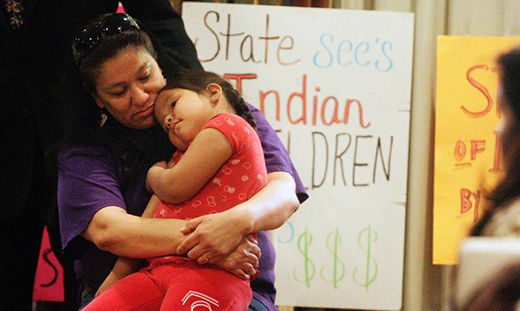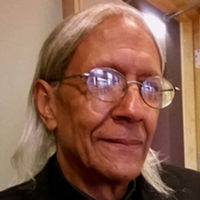
South Dakota Indian families and Tribes have just won a major legal victory, under the Indian Child Welfare Act (ICWA) that will resonate throughout the state and nationwide, as well. The decision issued by U.S. District Court Chief Judge Jeffrey L. Viken for the District of South Dakota on Mar. 30, ordered the state to comply with the ICWA, which mandates that Indian children be placed with tribal relatives or other tribes before non-Indian placement is considered.
South Dakota’s Department of Social Services was not only placing Native children in white foster homes first, but was also denying Indian parents and guardians any due process rights in the hearing process.
Viken ruled in favor of all the Indian plaintiffs’ claims and in his written opinion found that the state’s Seventh Judicial Circuit Court’s Presiding Judge Jeff Davis and other defendants “failed to protect Indian parents’ fundamental rights to a fair hearing.” Further, Viken found that state officials violated the ICWA of 1978.
Indian children were being forcibly, routinely, and illegally taken by state DSS workers from their homes; there was lack of adequate notice given to Native parents of hearings at which the children were placed in state custody; parents were not allowed to examine evidence or cross-examine witnesses and many hearings lasted only 60 seconds and most lasted an average of less than five minutes. In all of the cases heard by Judge Davis, one of several judges who heard the Indian child cases, Judge Viken found that Davis ruled against Indian families 100 percent of the time.
The background of the lawsuit is that for years DSS has removed over 740 Indian children from their homes annually and in overwhelming numbers sent them to white foster homes. There have also been instances of horrific sexual abuse, the most infamous being the Mette case which this writer has extensively reported.
This landmark victory in federal court resulted from a class action lawsuit which alleged that the state of South Dakota routinely violated the constitutional rights of Native parents and provisions of the ICWA. The case focused on the first 48 hours after an American Indian child is taken from home by DSS.
The lawsuit was filed in 2013 by private attorney Dana Hanna and Steven Pevar from the American Civil Liberties Union (ACLU) on behalf of the Oglala Sioux and Rosebud Sioux Tribes and parents Rochelle Walking Eagle, Madonna Pappan and Lisa Young representing all Indian parents in Pennington County, South Dakota. This was a federal civil rights lawsuit filed against Presiding Judge Jeff Davis, Pennington County Prosecutor Marl Vargo, state Department of Social Services Director Lynne Valenti and Pennington County Department of Social Services employee Luann Van Hunnik.
The lawsuit zeroed in on the very first court appearance and what happens in the “48 hour temporary custody hearing.”
Attorney Hanna called the custody hearings “shams.” Hanna added that the ICWA was passed in 1978 by Congress because of “Institutionalized anti-Indian racism” in state courts. Hanna further characterized the South Dakota court system in these cases as “fundamentally racist.”
As for the South Dakota courts ” These were virtually kangaroo courts,” said Attorney Pevar. ” There was nothing, nothing that any of the parents did or could have done. It was a predetermined outcome in every one of these cases.”
This was also a history-making case, in another sense, because the Department of Justice (DOJ) stepped in and came out resoundingly in support of the tribes and parents. It was the first time the DOJ has intervened in a federal court case involving the ICWA. The DOJ , in fact, filed an amicus brief in the lawsuit alleging that South Dakota was violating the rights of American Indian parents.
Over the years thousands of Indian children have been removed from their homes in court hearings in which the parents are rarely allowed to even speak.
This writer, while on investigative assignment in South Dakota, was told by many parents that often state judges said in open court that the ICWA would be ignored in their jurisdictions.
Since the landmark decision state officials have been conspicuously quiet- the state attorney general’s office declined to comment, going so far as to tell Associated Press (AP) that it was not directly involved even though DSS, a state agency, is a defendant. DSS itself has also declined comment to the media. The Pennington County Attorney’s went even further and refused to return media calls. Judge Jeff Davis also declined comment when contacted by the AP and the local press.
Viken has given the state defendants until May 1, to respond to his ruling, after which he will issue an injunction that will further resolve the issues raised by Indian families and the Oglala Sioux Tribe and the Rosebud Sioux Tribe. The state could appeal and take the case to the Eigth Circuit Court of Appeals. Needless, to say this fight is far from over, but so far Native Americans have a victory.
South Dakota’s defiance of federal law, in regard to ICWA, takes this writer back in history to that loathsome archenemy of Indian people, Andrew Jackson who infamously said in response to a Supreme Court decision in favor of the Cherokee Nation, ” John Marshall has made his decision, now let him enforce it.”
If the state continues defiant, many in the American Indian communities here say the federal government should, as it did in the South in the1950’s, send in the federal troops. Let it be Indian troops.
Photo: Kristina Barker/AP & Rapid City Journal












Comments